Free creative courses for Young People
Free creative courses for Young People
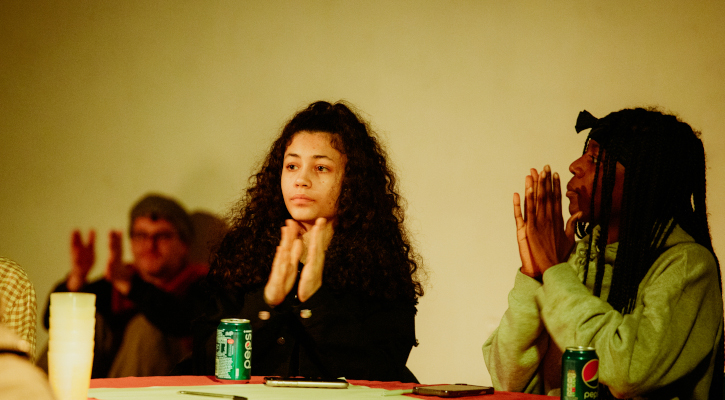
Speak Out Celebration 2023. Credit Alastair Brookes
Speak Out is a programme of free creative courses exploring ways in which creativity can be used to shine a light on Future Proofing (or, thinking about our impact on the planet), Neurodiversity and Injustice.
Delivered in partnership with City of Bristol College, Bristol Refugee Festival and Our Second Home, from Feb - June 2024 Trinity will host a series of workshops delivered by a professional artist or facilitator. The sessions will offer a supportive young people to develop creative and craft skills, be inspired by new ideas and build interpersonal and collaborative skills.
The programme was developed following an in-depth consultation with over 150 young people that took place in 2023. This included Trinity's CYP team visiting further education settings, schools, community organisations as well as an in-person event at Trinity.
Speak Out Programme:
Future Proofing – Students of City of Bristol College will explore their impact on the planet. Led by Carene, a sustainable fashion expert, the cohort will explore ways in which they can fight against fast fashion. Running Feb - Mar 2024
Neurodiversity - Kabbo Ferdinand, an African Indigenous storyteller and musician, and Natasha Gatward, an immersive performance artist and costume designer, invite 16 – 18 year olds to explore the ways in which movement and expression can explore Neurodiversity. Running April 2024.
Injustice – Hip-Hop artist Moyah, who has lived experience of the asylum system, will lead workshops for young people affected by the asylum system in order to create a performance piece addressing injustice. Running April 2024.
Speak Out Showcase: Young people who have taken part in Speak Out are invited to come together in celebration of their work at a showcase event at Trinity Centre. Each groups’ practitioners will be at the showcase to support the young people and to guide them through the experience of publicly sharing their art (17th June 6-8pm).
If you would like to sign up to the workshops please contact Liam, Youth Services Facilitator on liamc@trinitybristol.org.uk
Speak Out! Is supported by the We Move Fund: Youth Social Action aims to empower Black children and young people through Youth Social Action.

In Conversation: Saláma Kefentse and All Ah Wi Women's Group
In Conversation: Saláma Kefentse and All Ah Wi Women's Group
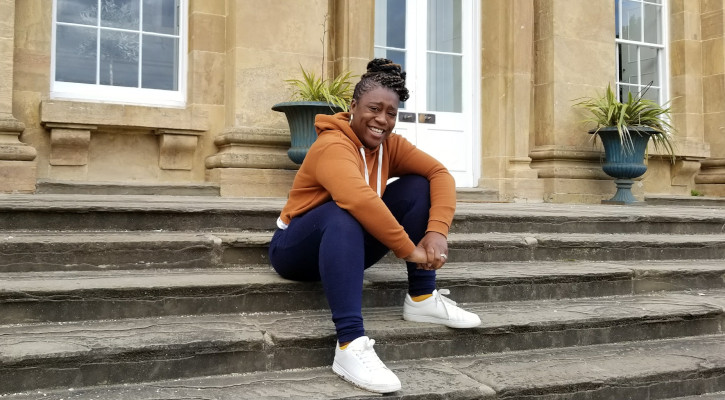
As part of the celebrations for this year's International Women’s Day, we caught up with Saláma Kefentse from All Ah Wi Women's group ahead of their Saturday 09 Mar event at Trinity. Click here to find out more about Saturday's International Women's Day Celebrations at Trinity.
Q: Hi! Tell us a little about yourself and the All Ah Wi Women's group:
A: My name is Saláma and I started All Ah Wi Women's group last year under my brand name Just Love Hub.
The All Ah Wi Women's group is a space for all women, especially those from the Caribbean and African diaspora. The group offers a sense of sisterhood and freedom to be just as you are without the added titles of mum, daughter, sister, aunty etc. It's an opportunity to spend time focusing on their needs rather than the needs of others.
Q: Where did the idea of the International Womens Day event come from?
After a joint conversation with staff at Trinity the idea was offered for us host an event to celebrate International Womens Day. They offered this opportunity to us and as the women in our group possess such inspiring skills and talents it seemed a great idea to offer them the space to showcase what they can do and show how amazing they are.
The group was developed because we need to have a space to go to with women who looked like me and could relate to the ups and downs life throws at us, have a laugh, a cry and a moan without judgement. Be free to try new things and talk about topics that aren't typical but create awareness and are thought provoking.
Q: What can we expect from the event?
Expect great music from DJ Kissan and DJ Delicious, Essential oil 101 from spiritual healer Michelle Meridith and a workshop on 5 steps to overcoming childhood trauma with Author Carmen Carrol, hosted by the All Ah Wi Women's group.
Q: Why do you think celebrations like International Women’s Day are important?
Events like these give women the chance to shine a light for each other and be seen for who they are and what they do. It brings women together and shares good energy, healing and connection. We get to congratulate our sister's for their hard work and be inspired by them too.
Q: How can people get involved or help All Ah Wi Womens group?
The All Ah Wi Women's group is looking for volunteer session leaders to help organise and run the sessions and board members / trustees to start as a CIC to help with fundraising to bring the ideas these women have created to life.
The All Ah Wi Womens International Womens Day event is on 09 Mar 2024 from 10am – 3pm and features workshops from Michelle Meridith and Carmen Carol, music by DJs Kissan and Delicious and Podcasting form Keep It Real Podcast, click here to find out more.
Opinion: Holding Onto Our Roofs When The Sun Ain’t Shining
Opinion: Holding Onto Our Roofs When The Sun Ain’t Shining
Jacobs Wells Baths - Image Credit: Sam Prosser
Preserving and maintaining community spaces is proving increasingly difficult as local authorities grapple with continued budgetary pressures. Some local authorities are facing or have already issued Section 114 notices – which means expected income isn’t enough to cover expenditure. In response, the Government is considering making it easier for councils to dispose of publicly owned assets to cover rising costs of essential services. Financial news provider, Bloomberg, sets out how, “The move would mark a sharp relaxation of the current constraints, which prevent councils from using money from asset sales to meet budget pressures from day-to-day services without approval from the central government.”
"The choices we make now in response to the challenge of preserving civic and cultural infrastructure in the face of financial uncertainty is a decision that will have lasting consequences for future generations" Emma Harvey
Community groups and charities are collaborating to devise shared solutions to protect civic and cultural assets from disposal and loss; from volunteering to manage local allotments and raising money to invest in parks and play areas, to taking on ownership of local pubs or community buildings and developing their own Neighbourhood Plans.
Whilst there are individual success stories of spaces saved, the challenge lies in how we create a national community asset transfer approach that is replicable, scalable and sustainable. As Brendan Conway, a leading voice in community assets, sets out in a LinkedIn post at the start of the year; “we must not valorise small precedents that have hidden foundations and assume that they are replicable.”
The current model places communities under increasing pressure to do more, though they may not equally hold all the necessary resources to convert short-term passion into sustained success. Existing funding schemes tied to short-term political cycles overlook the complexities of such projects, which require a variety of factors to align. Passionate people who care will inevitably overcommit and inexperienced individuals will underestimate what’s necessary to sustain a recovery effort over time. Some communities may hold the aspiration, but struggle to channel the right energy, investment or efforts consistently and continually. Others may just be overwhelmed, fatigued, or disheartened from past failed efforts to save the things they’ve loved and lost. This could lead to an increasingly disproportionate distribution of social resources, unless we proactively lay the foundations required to enhance success rates equitably across the breadth of UK communities.
The solution as to how we preserve civic and cultural infrastructure amidst financial uncertainty requires a nuanced, adaptable and holistic approach. It’s a delicate balancing act that, if we fail to get right, will leave our communities of tomorrow without the infrastructure they need to allow our more diverse, more densely populated neighbourhoods to function. The more we embark on these ambitious, quirky, complex projects, the more we will see projects fail. Should sites revert back to local authority control at a point where resources and capacity has further depleted, this will only compound risk of future asset disposal, not least because now one might also point to how the community tried, but failed to make it work.
In Bristol, there are a number of organisations driving a community ownership movement and a more strategic approach to community asset management, such as Bristol’s Community Anchor Network who have launched a manifesto to ask for more targeted support and investment to protect the city’s social fabric. More widely, Platform Places are collaborating with councils, community asset managers and owners to repurpose vacant high street properties, whilst Locality are continuing to promote their #SaveOurSpaces campaign by launching a new “community power revolution” to place more power in the hands of communities.
The choices we make now in response to the challenge of preserving civic and cultural infrastructure in the face of financial uncertainty is a decision that will have lasting consequences for future generations. To ensure a resilient and culturally vibrant future for UK communities expanding in diversity and population density, we must adopt a nuanced, bespoke and holistic approach to the assets that underpin our daily lives; one that embraces all the complexities, personalities and idiosyncrasies of our changing social and cultural landscape. And we need to do that pretty soon, before we have no space left to fight for.
Emma Harvey, CEO Trinity Community Arts
#SoldFromUnderYou
#SaveOurSpaces
About this article
- Trinity are committed to advocating for shared community and cultural spaces. We are members of Locality and are currently leading an appeal to restore Jacobs Wells Baths in Hotwells.
- Read our 100 Beacons report that shines a light on the importance of – and understand the risks posed to – Bristol's community and cultural assets.
- Read opinion piece "The preservation paradox: sell now, pay later"
Look Back: Models of Listening and Participation in Culture
Look Back: Models of Listening and Participation in Culture
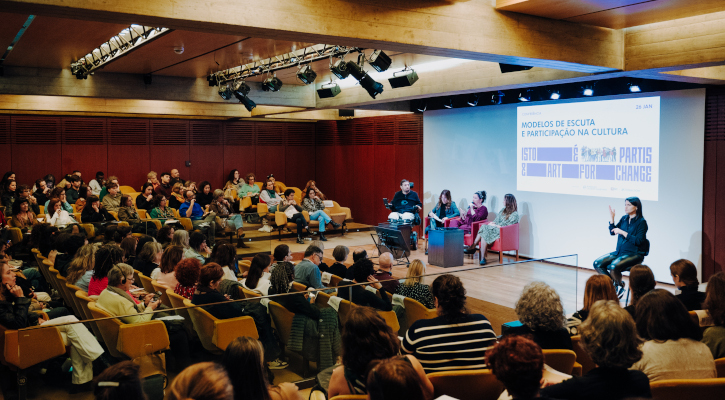
Isto é PARTIS & Art for Change 2024 - Image Credit: Carlos Porfirio
In January, Trinity participated in the Isto é PARTIS & Art for Change 2024 conference held in Lisbon, Portugal, shining a spotlight on the transformative potential of citizen-led approaches in the arts.
The Calouste Gulbenkian Foundation and "La Caixa" Foundation are actively working to platform and support the tangible impact of participatory arts initiatives, reshaping cultural dynamics, and fostering more just and cohesive communities. The conference served as a beacon for continued dialogue and action in the pursuit of a more inclusive cultural landscape.
Featuring panels exploring diverse methods of citizen involvement in cultural dynamics, Trinity Community Arts, represented by CEO Emma Harvey, emphasized the significance of creative community spaces in shaping cultural dynamics in the arts. Emma shared insights into Trinity's work managing the Trinity Centre as a publicly-owned civic arts space, alongside efforts to save another publicly-owned asset, Jacobs Wells.
Trinity shared a panel with Lara Seixo Rodrigues, Marta Silva, and Miguel Atalaia, highlighting examples of collaborative and citizen-led cultural activity, including the Largo Residências in Lisbon and the Bons Sons festival in Tomar. Bons Sons - akin to Trinity's annual Garden Party, the annual community festival involves the entire village coming together to deliver a celebration of music, culture and local pride—an inspirational example of true citizen empowerment.
Trinity's partner, Saad Eddine Said, Co-Director of the Citizens in Power initiative, delivered a keynote speech on avenues for active citizen-led decision-making. Trinity, in is working with Citizens in Power and St Paul’s Carnival, to develop a Citizen Assembly for Culture, supporting communities in the West of England Combined Authority to shape their cultural delivery priorities and plans – funded by Calouste Gulbenkian Foundation (UK Branch) and the West of England Combined Authority. The conference also highlighted Battersea Arts Centre’s social enterprise programme, The Agency, which uses a co-design model to support young people to unlock their creative potential.
This collaborative effort, led by The Calouste Gulbenkian Foundation, amplified initiatives that are unlocking the transformative power of citizen-led approaches in the arts. The Foundation's commitment to fostering partnerships between communities, creatives, and institutions, as showcased in the PARTIS & Art for Change initiative, exemplifies a forward-thinking approach to shaping the future of towns and cities. This conference facilitates key conversations and projects that contribute to the creation of more just, cohesive and culturally vibrant communities.
Further reading:
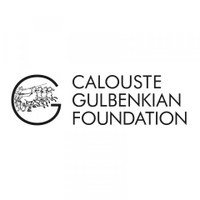
Celebrating Windrush
Celebrating Windrush
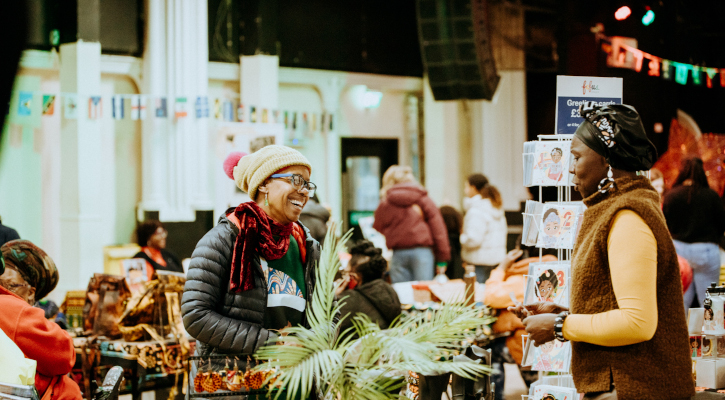
Festus Market. Photo credit: KoLAB Studios
Throughout 2023, we celebrated the 75th Anniversary of Windrush through our community arts programme. Working with key partners including St Paul’s Carnival, Ujima Radio, Eastside Community Trust and the Malcolm X Centre, we created a community-led project to celebrate the communities who moved to Bristol during the 1950s and to give voice to Caribbean elders' experiences, resilience and memories.
"I had wicked fun. When are you doing it again?" Feedback, Festus
In partnership with Tamasha Theatre and Coney, we supported the creation of 'Duppy Hunter', an audio adventure set on the streets of St Paul’s. The script was developed during the summer of 2023 with the support of current and former St Paul’s residents and members of Malcom X elders. The listening experience went live in October to coincide with Black History Month. We organised a special listening party in November for the Malcolm X Elders who were unable to experience the walking tour due to their access needs.
In partnership with Eastside Community Trust, we programmed a screening of 'Barrel Children' at Easton Community Centre. The film explores the challenges of Black families separated by migration during the Windrush era.
In December, we hosted 'Festus' - an all-day event celebrating Caribbean/Black British culture. During the day we open the door for an indoor craft market led by Black traders and invited acclaimed, locally-based poet, Zaykia Mckenzie to perform to traders and visitors. Alongside this, Ofeila Balogun from Irie Dance Company led a Caribbean/African dance workshop.
As part of the evening's celebrations we screened 'Inna Wi Carnival', a documentary film commemorating the role of Bristol’s Caribbean elders in establishing the first St Paul’s Carnival. This was followed with a quiz, party games, dance floor 'foolery' and a performance by rapper/spoken word artist Jonny Steel.
Across the year the project connected with over 500 people - using arts and entertainment to share, explore and celebrate the history and experiences of the Windrush generations in Bristol. Due to the success of the Festus market, we will be working with stakeholders to bring additional events in 2024 - watch this space.

Celebrating Independent Venue Week
Celebrating Independent Venue Week
Bristol's Idles filmed their video in independent venues
Trinity is proud to be an grassroots music venue and this Independent Venue Week Marketing Assistant, Sam Prosser, shines a light on some of the other brilliant independent venues the city has to offer and how gig-goers can support the venues in Bristol.
Strange Brew
Strange Brew, located on Fairfax Street in Central Bristol, is one of the city’s newest independent venues. Having opened in September 2020, Strange Brew has quickly become of the city’s key locations for DIY bands and promoters, providing an eclectic mix of club nights, gigs, exhibitions and talks. We’re very excited to be bringing Bristol’s own Waldo’s Gift to Strange Brew on 02 March as part of our in-house music programme, Trinity Presents.
The Louisiana
The Louisiana is a 140-capacity, family-run venue that takes pride in putting on the best musicians from Bristol and beyond for the last 35 years, becoming a vital space for emerging artists, as well as hosting some of the UK’s biggest artists in their early years, such as Coldplay, Muse and Idles. The Louisiana is now a key part of Bristol’s music scene, as part of Dot To Dot Festival and Harbour Festival.
Exchange
Located a stone’s throw from Trinity at the bottom of Old Market, Exchange is a Community Benefit Society focused on supporting a wide range of musical projects and creative endeavours. Exchange opened it’s doors as a Live Music / Club Venue in August 2012. Since opening they have played host to a wide array of artists including The 1975, Haim, Four Tet and many more.
How you can support independent venues:
It’s never been more important to recognise the massive contribution of independent venues and their role in the music scene. 2023 was the UK’s worst year for venue closures, with Music Venues Trust reporting that 125 grassroots venues closed over the last 12 months. More than ever, it is vital that we recognise and support the independent music venues that contribute so much.
Buying tickets directly from venues: By buying tickets directly from a venue’s website, or from a local ticketing platform, you are ensuring that a higher percentage of the ticket price goes directly to the venue, supporting their operational costs and staff. In addition to this, early ticket purchases also make a significant impact, providing venues with crucial upfront revenue and helping them plan and execute events seamlessly.
Supporting venues through bar sales: Bar sales are one of the primary sources of income for independent venues, so make sure you get down early and buy a drink or two to support your favourite venue. Choosing to enjoy refreshments at the venue, whether it be a locally brewed pint or a signature cocktail-for those who don’t drink, there’s never been more options for non-alcoholic drinks, with many venues providing a wide range of alcohol-free drinks.
Spreading the word: Many venues depend on word-of-mouth support to promote their events. Without the substantial marketing budgets of larger venues, it is crucial to actively express your support for your favourite independent venues. Sharing photos online and telling your friends about your favourite shows at local independent venues boosts their visibility and can act as a vital lifeline for these independent establishments.
Music Sessions for Young People
Music Sessions for Young People
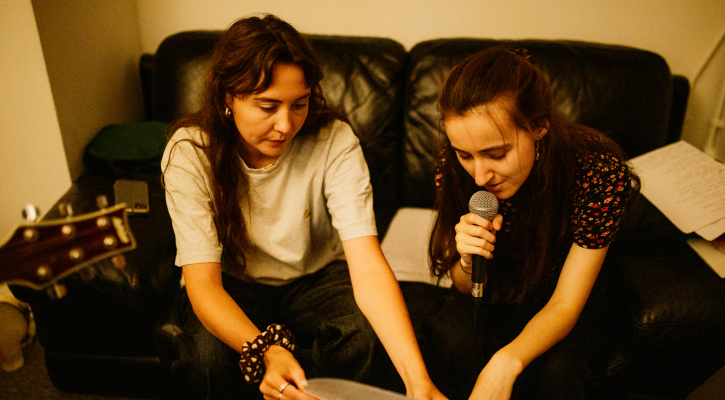
Image Credit: Alastair Brookes
As part of our Children and Young People's programme we offer one to one or small group (up to three people) music sessions for young people aged 11-25yrs. These sessions are tailored to help young people develop skills, build confidence and support to take their next steps, whether it be to access further music-making provision or to re-engage with the educational system.
We work with professional music tutors who use a trauma informed approach to support young people to identify the areas they are interested in exploring in the sessions. This could involve anything from learning guitar or piano to recording an original rap track. Tutors facilitate and encourage young people to express themselves in whatever way they feel inspired to.
‘I love coming here, it’s a home away from home’ - Feedback, young person, 1-2-1 sessions
Sessions take part in our fully equipped studio rooms. Our live rooms feature two drum kits, a large electric piano and a collection of bass, electric and acoustic guitars. Our digital studio allows young people to access synthesisers, drum machines and a professional level microphone set up for recording, ideal for vocalists or those interested in music production. Both studios are capable of making high quality recordings which can be shared with the individual (or group) at their request.
If you are supporting a young person who would benefit from accessing our music provision please contact the Children and Young Peoples team for further information including prices for sessions on info@trinitybristol.org.uk.
These sessions are supported through funding from NIMBUS Sounds, a partnership between Creative Youth Network (CYN), Aspiration Creation Elevation (ACE), Basement Studios and Trinity Community Arts.
LOGO
Coming up: Theatre and dance this Spring
Coming up: Theatre and dance this Spring
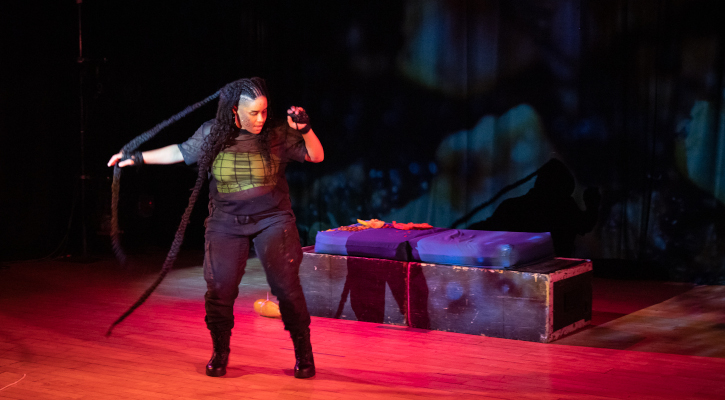
We are excited to launch our Spring Theatre and Arts programme at Trinity that offers audiences an exciting exploration of themes around counterculture and alternative lifestyles, queer untold stories, creative play and the power of movement.
The programme kicks off with Igloo on 16 Feb. Igloo is a non-verbal, playful theatrical experience filled with warmth, sensation and gentle exploration, suitable for babes in arms and pre-schoolers aged 0-3 accompanied by their carers. As part of each performance there will be a facilitated play session. The performance is non-verbal, but the play session contains some words. Audience members will also be given an Igloo picture book and other creative ideas to enable families to continue with creative play at home. Igloo is originally a Travelling Light and Bristol Old Vic co-production. Spaces are very limited, click here to sign up.
Later in February, on 23 Feb, we have Kill The Cop Inside Your Head, a theatre piece from spoken word and performance artist Subira Joy, exploring their experiences of being targeted by the police as a Black, queer and trans person in the UK. Combining striking visual imagery with powerful language, this new work examines the impact of the police in our communities and how we internalise their role to repress and suppress ourselves into submission. This is a rescheduled event, originally scheduled for November 2023. Click here to get your tickets.
Full Bloom Festival of dance for and by older people returns to Trinity on 16-17 Mar. Throughout the day, participants can take part in artistic workshops and dance performances including matinee and evening performances showcasing the work of Gerry's Attic Dance Company, a resident dance company who run weekly sessions at The Trinity Centre. Click here to get your tickets.
Closing out our Spring Theatre and Arts season, we have Roadside on 05 April, a solo theatre show inspired by interviews with roadside dwellers across the South West and drawing on the musical history of this new traveller community, from festivals to free parties, to songs around the fire. Click here to get your tickets for Roadside.
Investment in culture for the West country
Investment in culture for the West country
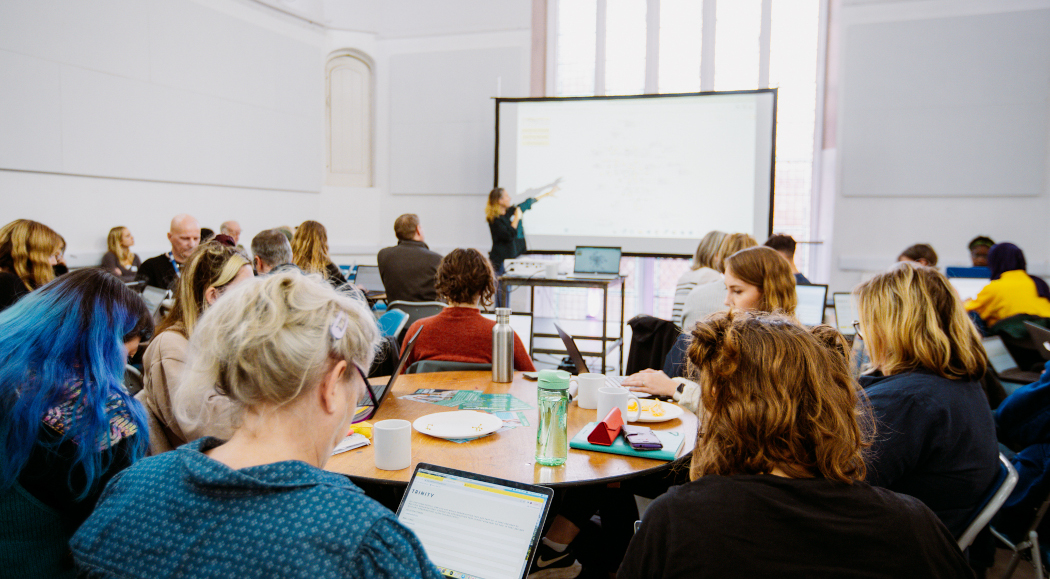
Community stakeholders take part in Understory a digital mapping session by Onion Collective and Free Ice Cream. Photo credit: Trinity Community Arts/Alastair Brookes
A £3.1million investment package has been secured by Mayoral Combined Authority from Arts Council England and match funders to deliver a two-year programme that will open up the creative sector to more diverse talent, to create opportunities for more communities take part and create arts experiences and build a resilient sector that will drive economic growth in the West of England.
'Culture West' will include the creation of a citizen-led cultural delivery plan for the West of England region in 2024 through our Citizens' Assembly project that we developed in collaboration with St Paul's Carnival and David Jubb (Citizens in Power).
The Citizens' Assembly pilot took place in 2023 and was funded by the Celeste Gulbenkian UK Branch. As part of the partnership project, we delivered a series of exploratory workshops that included inviting South West residents to take part in sessions. The pilot project has helped shape the delivery for the 2024 project region-wide Citizens' Assembly.
Alongside the Citizens' Assembly. 'Culture West' will also offer support for creative professionals, mentoring and business advice, commissioning new festivals and offering industry-led skills training. The project will also see the region's schools have increased access to inclusive cultural experiences, with support for museum and theatre visits, artist residencies, and skills sharing.
£1m investment means we're one step closer to saving Jacobs Wells
£1m investment means we're one step closer to saving Jacobs Wells
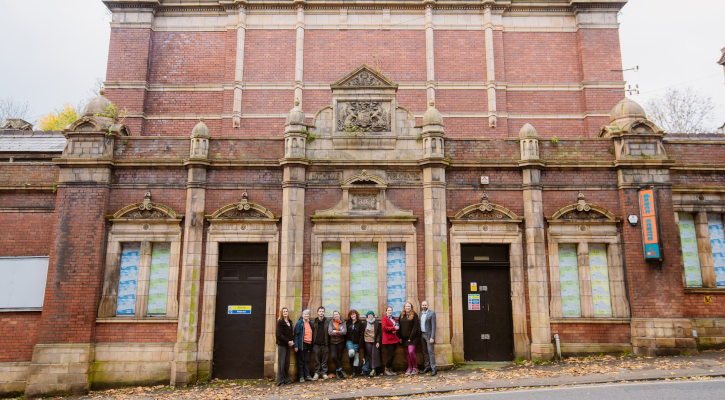
Amy Hutchings, with the support of Anna Haydock-Wilson, created a bespoke artwork for Jacobs Wells as part of the Fundsurfer appeal. Photo: Alastair Brookes
Thank you Bristol - we wouldn't have achieved this milestone without you!
Jacobs Wells – formerly known as Bristol Community Dance Centre in Hotwells – is one step closer to being revived in 2025 following a £1,050,000 grant from The Department for Levelling Up, Housing and Communities’ (DLUHC) Community Ownership Fund. The investment will help to deliver plans developed in response to a community campaign to transform the derelict space into a vibrant community arts hub.
Since the start of 2023, the race has been on to save the Grade II listed building following news that Bristol City Council had listed the asset for disposal. Backed by community stakeholders including Hotwells & Cliftonwood Community Association, artists and local councillors, we set out on a mission to raise the funds needed to repair and restore the building.
"This is another massive step in a hugely ambitious recovery effort and the Trinity Board would like to extend our huge thanks to DLUHC, match funders and supporters for sharing our vision." Trinity Trustee Dr Fidel Meraz
This latest investment builds on Bristol City Council's 35-year Community Asset Transfer offer to Trinity and ongoing survey work funded by Nisbet Trust and match funders to assess and scope the repairs scheme and undertake emergency measures to stop further damage.
The grant from DLUHC matches over £400,000 pledged in support of the project from local funders Nisbet Trust, John James Foundation and match funders including individuals who have been donating to an online Fundsurfer appeal.
The journey so far...
The Grade II Listed building has sat dormant since 2018 and faced an uncertain future at the start of 2023 when plans to reinstate it as a pool fell through. A petition was launched to save the building by the Hotwells & Cliftonwood Community Association, with the help of Trinity and it was subsequently listed as ‘At Risk’ by SAVE Britain’s Heritage due to its dilapidated condition.
We are actively progressing detailed surveys to the fabric of the building to assess the building’s condition and viability; this includes essential surveys to scope and cost works to inform decision making and capital-works. Subject to these, Trinity’s vision is to secure an estimated £4 million for a two-phased capital project and bring the building back into use in 2025 as a home for dance and community activity. See more about our plans, here.
Trinity Trustee, Dr Fidel Meraz who has been working with staff and community supporters to drive the appeal said:
"We want to take this opportunity to share a heartfelt thank you to all who contributed to the mission so far. From the encouraging letters from residents to the dedicated volunteers who generously shared their time to help campaign to restore the building, your support has been invaluable. We wouldn't have achieved this milestone without each one of you."
Dan Norris, Metro Mayor who recently visited Jacobs Wells for a behind-the-scenes tour said:
“Jacobs Wells Baths is full of potential, and I know many local people are really behind getting this building restored and opened again for the benefit of the community. I’m delighted that the hard work of Trinity Community Arts has paid off to secure this cash.
"As I’ve seen when I looked around, there’s a lot to do to before Hotwells residents can enjoy this facility again, but the potential is amazing. This is another important step on the journey.”
“Each step in this journey paves the way for the next and this latest grant from DLUHC brings us ever closer to building's revival. Its success is still very much dependent on your support - we invite you to join us and show you care by giving to our Fundsurfer". Emma Harvey, CEO
Councillor Craig Cheney, Deputy Mayor for Finance, Governance, Performance, and Culture, Bristol City Council said of the news:
“It was brilliant to see the new artwork at Jacobs Wells Baths last month, after we awarded a 35-year Community Asset Transfer lease in July to bring the Grade II listed site back to life.
"Congratulations to everyone at Trinity for securing this major £1 million investment in Jacobs Wells Baths. We hope that it will be a giant leap on the journey to delivering a thriving community arts hub.”
Our CEO Emma Harvey said:
“The success of a project like this is less about one thing and more about overcoming a series of interconnected challenges - from addressing immediate liabilities and securing funding to galvanising support from local stakeholders, alongside showing that the building has a long-term, viable future.
“Each step in this journey paves the way for the next and this latest grant from DLUHC brings us ever closer to building's revival. Its success is still very much dependent on your support - we invite you to join us and show you care by giving to our Fundsurfer".
Read more about the Community Ownership Fund here.
Thanks For Your Support
Thanks For Your Support
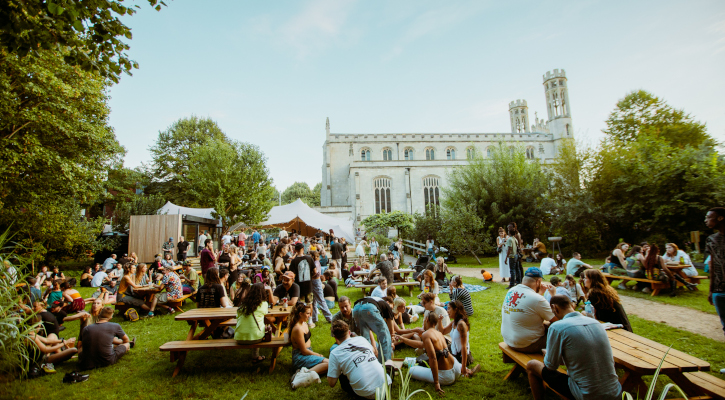
Garden Party: Voyages - Image Credit: Alastair Brookes
Thank you to everyone who has donated to Trinity and supported the work we do - your support throughout 2023 has enabled us to uphold our values to respond, amplify, and empower communities through arts and culture.
This year, with your support, we have taken the first steps to shape a new future for Jacobs Wells Baths, the Grade II former dance centre in Hotwells, in which we are driving a collective vision to restore and reopen the space for this and future generations.
As part of our children and young peoples programme we created pathways for some of the youngest members of the community to take part in creative provision, through free-to-access sessions for children such as Carnival Dance workshops with Movema, summer garden sessions, and music-making workshops for ages 16-25.
With the support of the Heritage Lottery Fund we uncovered 100 years of radicalism in Bristol, creating an interactive timeline and publishing a book about Bristol’s history of activism, through oral testimonies and first-hand accounts from people who were part of, and shaped by, protest movements in Bristol. These testimonies are part of our online archive.
We programmed a diverse range of arts and music as part of our in-house programme ‘Trinity Presents’, offering a platform for local up-and-coming artists and collectives such as RepresentAsian, as well as putting on shows with legendary artists such as Donae’o. We welcomed over 3000 people to our free community Garden Parties over the summer, programming a range of activities with the community in mind, as well as platforming a number of incredible local artists, bands and DJs.
In collaboration with Tamasha Theatre Company and Coney we created an interactive theatre piece ‘Duppy Hunter'. The piece was inspired by the stories shared by residents of St Paul’s during workshops within the community, in which participants reminisced over the old shops, nightlife, community movements and music which filled their younger years, which informed the narrative of Duppy Hunter.
As part of our Communities and Neighbourhoods programme we have been collaborating with organisations and the neighbourhood surrounding Trinity to celebrate and build the social connections within our locality. We linked with Onion Collective to create a digital map of unseen community connections, we supported communities who may be traditionally underrepresented to host community led events, from a regular Equality Dance event to a disco for the over 55’s to a celebration of Caribbean and Black British Culture in Festus Market and Party.
We're really excited for 2024, where we'll continue using the arts to celebrate and connect with local communities. We hope you can join us too!
Thanks for your support this year – we couldn’t do it without you.
Look back: Duppy Hunter
Look back: Duppy Hunter

Duppy Hunter. Photo Credit: Sophia Stefelle
Over the summer, we teamed up with Tamasha Theatre Company and BAFTA award-winning game designers Coney to develop and deliver ‘Duppy Hunter’, an interactive theatre piece where audiences are invited to embark on a playful exploration of St. Paul's, assuming the role of Duppy Hunters in pursuit of an elusive spirit hidden amongst the streets and sights of this vibrant neighbourhood.
"A great way to hear about local history while walking around" Feedback, Audience Member
Duppy Hunter was created as part of the third instalment of ENDS & TALES, a series of immersive smartphone adventures. Previous adventures have included uncovering the untold stories of the Bangladeshi community in London’s Brick Lane and Chinese community in Liverpool’s Chinatown.
Bubbling with magical realism, audiences were invited to help fictional character, Josie (played by Nadia Williams - I’m Not Running (2019), Broadchurch (2013)), track down a duppy that has become loose in St Paul's. Josie is from a line of obeah women priestesses that have fulfilled the role of duppy hunters, who hunt for duppies that are trying to capture human souls to walk the earth and leave a host open to future possessions. Through helping Josie to solve the riddles the duppy leaves on its trail, the adventure will take audiences past Stapleton Road and Pennywell Road and crossing the Danny, before heading onto to St Paul's. Promising to conjure up nostalgia and a Bristol of yore, audiences will be immersed in stories unfolding through their headphones.
The performance was inspired by the stories share by residents of St Paul’s during workshops within the community that were delivered in partnership with 'Malcolm X Elders' community group. In the workshops participants reminisced over the old shops, nightlife, community movements and music which filled their younger years.
During one workshop one attendees reflected that they were really happy that to be able to share their histories of coming to Bristol from the Caribbean in the 1960's and 70's. Reflecting that this brought back memories of their younger days attending night clubs such as the famed 'Bamboo Club' , and the underground 'Shabene/Shubs' parties in the 70's. They also remembered going coming to the Trinity Centre in the 70's when it was an African Caribbean Community Centre
Writer Duppy Hunter Dr Edson Burton and Director Hannah Adu-Boateng then created a performance that mixed a walking tour, promenade theatre, and gaming elements to create an adventure and touching intergenerational story.
In total 71 downloaded Duppy Hunter and 20 took part in the community workshops. The performance is available as a free download for anyone to experience. Click here to download now.
In Conversation: Norma Daykin
In Conversation: Norma Daykin
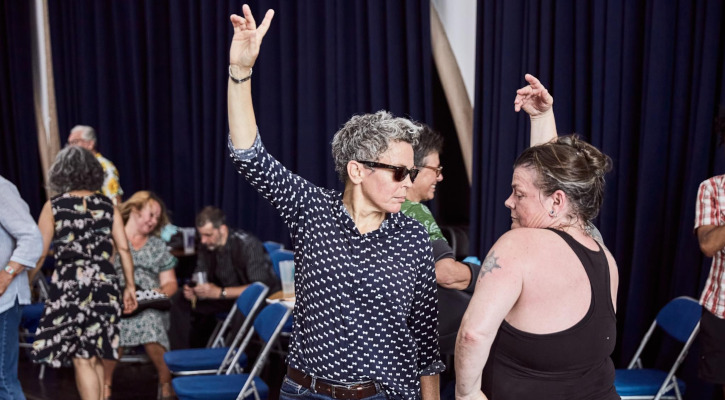
Bristol Equality Dance. Credit: Norma Daykin
Ahead of Bristol Equality Winter Tea Dance at Trinity on 07 Jan, we caught up with Norma Daykin to find out more about Bristol Equality Dance, a series of regular dance classes and dance socials, welcoming LGBTA+ and same-sex dancers, their friends and supporters.
Hi Norma! Please introduce yourself and tell us a little about your background and how you got into dance.
I've been dancing since I was a child. Both my parents were active in the local scene, my Dad as a musician and my Mum as a dance teacher. Although I've always enjoyed dancing, as I got older, I became frustrated with some aspects of the mainstream dance culture. For example, I was aware that the language used by some teachers was very gendered, assuming fixed roles for men and women, and that even though it was a common sight to see two women dancing together, male couples were discouraged in mainstream classes and social events.
Can you tell us about Bristol Equality Dance and how it came about?
I started attending equality dance events in London and other European cities where the atmosphere is very different. At these events, dancers aren't expected to adopt fixed roles as leader or follower, and people don't tend to stick with the same partner during classes or social dances, which creates an inclusive and sociable and environment where everyone is accepted. I've always reflected this in my own classes in Bristol, where I've been teaching salsa, latin and ballroom for almost 20 years. Attitudes have become more accepting following the inclusion of same sex couples in Strictly, but I felt that there needed to be a more visible LGBTQ+ led dance and social project in Bristol. We are affiliated with the UK Equality Dance Council, which advocates across a range of activities for LGBTQ+ dancers, from classes and social dances through to competitions, and seeks to educate and encourage mainstream teachers, promoters and clubs to make sure that same gender and LGBTQ+ dancers are welcome everywhere.
How did you relationship with Trinity come about?
I've taught Latin and ballroom classes at Trinity for about 15 years, leading Gentle Dance classes for over 55s every Monday and also providing intergenerational social dances in collaboration with LGBT Bristol. I love the ethos of Trinity and their commitment to community arts, and the space itself is great for dancing, with two wonderful floors and atmospheric spaces. I'm delighted to be able to host our Equality Tea Dance there.
Tell us about receiving a community award UK Equality Dance Council award in 2022
The award was for services to the same sex/equality dance community, and it was given in recognition of the work I'd been doing in Bristol over the last 15 years, starting with a small group of dance students who wanted an alternative approach. I continued during the pandemic, hosting weekly zooms for LGBTQ+ dancers so they could stay in touch, enjoying music and practicing steps and technique at home. It really helped to keep the idea of dancing alive in people's minds and to maintain social bonds and friendships even though we weren't able to meet on person. Once we were able to meet up outside, I held a regular line dancing class on the Downs and people came in all weathers to meet up, see familiar and new faces, and enjoy a bit of exercise. From this foundation, classes have grown, and we now offer regular classes for beginners and improvers as well as social dances, performances and visits to equality dance friends in surrounding areas including Wales and London.
What can people expect from Bristol Equality Winter Tea Dance on 07 Jan?
This is our second such event following our summer dance which was attended by people from all over the UK. Our DJ will again be Jacky Logan, who has led dance events for many years with her Jacky's Jukebox project, and who was awarded a British Empire Medal for her services to same sex/equality dancing. The event will start at 1pm with a warm-up class, suitable for people with all levels of dance experience. There will be non-stop dancing throughout the afternoon with a wide range of dances, from traditional ballroom and latin through to salsa, Argentine Tango, Lindy Hop and West Coast Swing and some popular line dances. There will be people on hand to show less experienced dancers the steps. Most importantly, people can expect fun and a warm, friendly atmosphere, and, of course, tea and cake!
Do you have any other plans for Bristol Equality Dance that you’d like to share?
This event is part of a dance weekend we are hosting. On Saturday 6th January we'll be offering an introduction to Swing Dance with a Balboa Swing class, and a chance to dance other swing styles. This event is a charity fundraiser, in collaboration with the LARA (Lorraine Ayensu Refugee Arts) project, which supports refugees and asylum seekers in Bristol using music and arts. The event is at the ElmGrove Centre in Redland. Following that we'll be offering regular classes and socials, and we'll be back at Trinity for our Summer Tea Dance on 2nd June 2024. You can find out more details about all these events on our website.
If you'd like to get involved with Bristol Equality Winter Tea Dance on 07 Jan, click here to find out more.
Opinion: Bristol Arts Funding
Opinion: Bristol Arts Funding
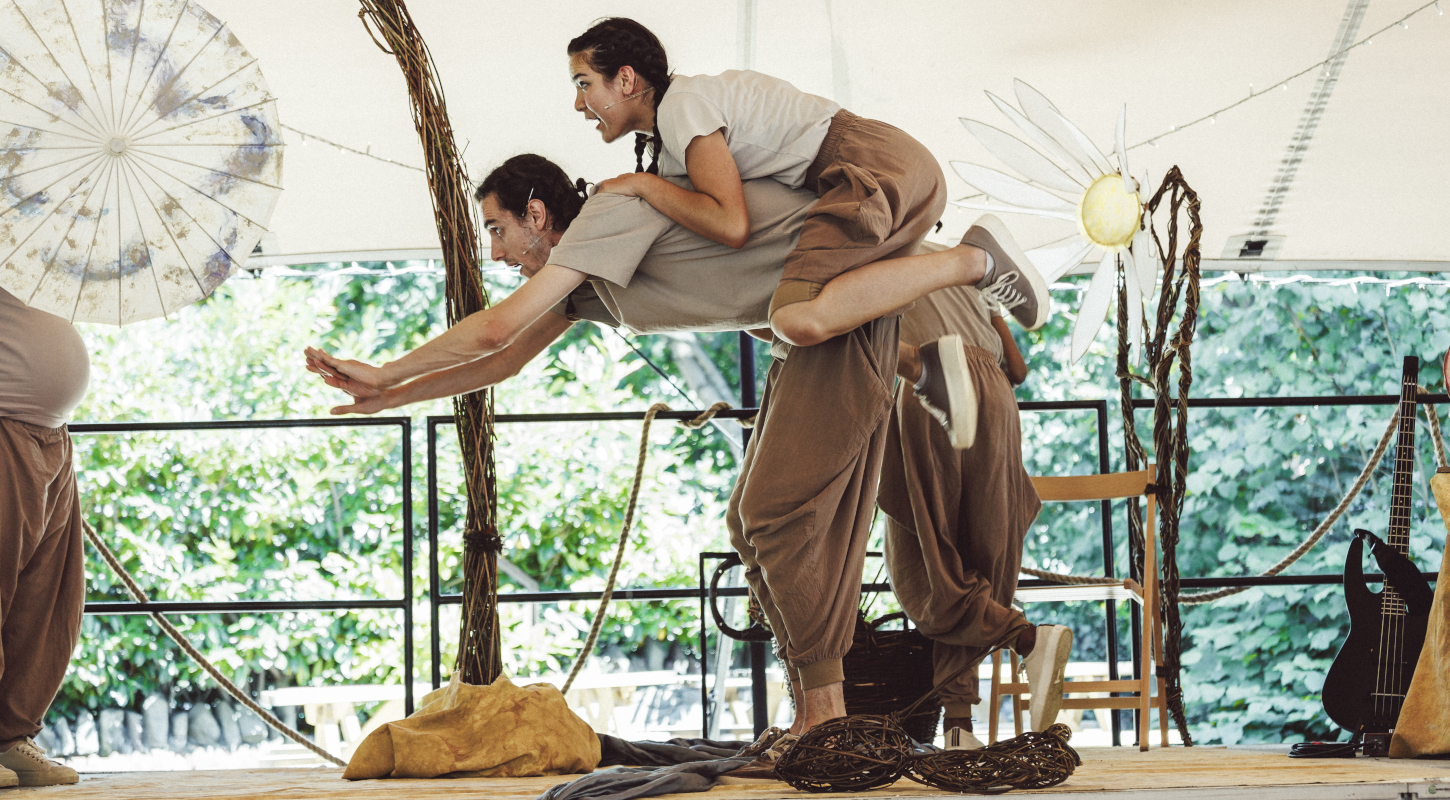
Tide and Tales perform during Summer Stay and Play sessions. Photo credit: Alistair Brookes
Trinity CEO, Emma Harvey, reflects on the challenges facing Bristol arts in the context of the wider cuts to arts funding and the impact this has on limiting pathways into careers in the creative industries.
In December 2023, Bristol City Council (BCC) announced their decisions for the Cultural Investment Programme, awarding grants in principle to 15 organisations. This included Trinity, newly funded Unique Voice, and Travelling Light Theatre Company who recently lost their regular funding from Arts Council England. Also Acta, ASLS, Asian Arts Agency, Bristol Pride, Circomedia, CYN, KWMC, Paraorchestra, Rising Arts Agency, Spike Island, St Paul’s Carnival and the Tobacco Factory.
With nearly a 40% reduction in total funds compared to past rounds, 13 groups missed out on regular investment. This included previously funded groups Bristol Old Vic, Encounters, Exchange, IBT, MAYK, RWA, Saffron, St Georges, Trigger and Watershed, alongside new proposals from APE, SSGB and Wardrobe Theatre.
"Rather than sharpening our elbows to fight for the crumbs that fall from the table we should be Oliver Twisting it up and asking for more."
As testament to the sector’s precariousness, two long-standing arts organisations were listed as, “closed or closing so not considered for investment”. Those not selected have responded with concerns about the continued cost of living crisis reducing audience revenue alongside rising overheads placing pressures on finances. Cultural institutions traditionally seen as too big to fail are facing an uncertain future and all funding is still subject to annual approval. This continued uncertainty means we're all on a sinking ship, just at different points of an inescapable decline.
Successes and setbacks are all part of business as usual at Trinity. After almost 20 years the best I can say when someone asks if we'll be here in twelve months is, "hopefully". In the voluntary sector, survival is as good as it gets. Hearing frequent ‘Nos' then trying to work out what's next is part of the job. Competitive funding rounds linked to political cycles are perhaps the worst at breeding a "them and us" mindset, making organisations old and new, big and small go up against one another for ever decreasing funds. It creates a short-term focus and leads to over-commitment, particularly from those smaller, newer groups desperate to move from being “out” to “in” any funding portfolio round. It leads to an unrealistic emphasis on measuring the intangible that benefits no one and decreases our appetite for risk, stifling the very creativity we’re seeking to support.
Rather than sharpening our elbows to fight for the crumbs that fall from the table we should be Oliver Twisting it up and asking for more. Were BCC to fund all 30 organisations listed to the maximum annual grant amount of £30k per year, this would amount to the amount to less 2% of the city’s total annual revenue spend. With many administrations nationally issuing or on the verge of section 114 notices due to difficulties in delivering balanced budgets, this can make such a case for arts funding appear entitled and out of touch with the everyday suffering of many across the country. But cuts to arts funding are part of a wider narrative (see links, below) of reduced investment in the arts that deprives those without the means from carving out meaningful experiences and careers in the creative industries.
Arts can be an easy thing to cut in difficult times but we’re doing so to the detriment of those who benefit from its power most. There is an intrinsic value that’s accepted and widely evidenced. Art is good for us; our economy, our health, our sense of place and belonging. And yet, one of the wealthiest city's in one of the wealthiest countries globally can’t even resource the creativity that sits at the heart of our local identity.
Collaborating with three local primary schools, Trinity recognises the significance of early engagement with culture in igniting creative aspirations. Children locally and nationally have witnessed reduced access to arts education compounded by challenges stemming from the pandemic and the ongoing burden of cost of living limiting access to out of school activities.
The ongoing decline in arts investment nationwide results in a gradual erosion of our opportunities to engage with the arts, limiting our cultural pathways. As the voices shaping our shared narratives become fewer, the story of our national identity risks being conveyed through an ever narrowing lens. Over time, this reduces the chances for individuals without existing wealth and means to pursue meaningful careers in an industry that contributes billions to the UK's economy annually.
It is commendable that, for the time being at least, BCC have sought to protect what remains of their public subsidy for the sector and focus what resource it can with the aim of sustaining participatory arts provision within neighbourhoods. But if we really want to ensure everyone has the opportunity to access and make art we need to think of better ways to ensure the investment is felt beyond a handful of suspects, however usual or unusual.
Some of the most successful schemes to support arts and diversify the arts sector have come from creative co-option of back-to-work schemes, from Future Jobs Fund and the recent Kickstart Scheme, providing paid entry level roles for <25s, to Thatcher’s Enterprise Allowance, which enabled some of the UK’s most prolific cultural practitioners to carve out their early careers and saw the birth of Brit Art movement.
Some trusts and foundations are catching on and supporting organisations and creatives in new and flexible ways. As far as public subsidy goes, we’re fighting for a seat at a table where chairs are continually being taken out of the game. Who will secure the chair once the music stops? A more impactful path involves collaborative efforts to lay the foundations for fairer resource distribution. Let’s stop playing someone else’s game and tip the table over.
By Emma Harvey, CEO
Further reading:
Bristol City Council defends cultural venue funding cuts (BBC)
Restore Bristol arts funding! (Equity)
The arts are in crisis (Gal Dem)
Government urged to intervene over local arts cuts (Campaign For The Arts)
Funding cuts and weak economy send UK’s visual arts into crisis (The Art Newspaper)
How will art funding cuts in schools affect creativity? (It’s Nice That)
Huge decline of working class people in the arts reflects fall in wider society (Guardian)
Hype Dance Lockdown Challenge
Hype Dance Lockdown Challenge
Trinity's resident Hip hop and urban dance troupe Hype Dance Company know how to keep themselves occupied in lockdown! #LockdownChallenge HYPE (Helping Young People Excel) Dance has been running for more than 13 years. Dancers aged 5-18 years of age come to Trinity to rehearse every Wednesday. You can find out more about HYPE and the rest of our community programme on our website 👉 here
Local Artist backs Fundsurfer to restore much-loved Jacobs Wells
Local Artist backs Fundsurfer to restore much-loved Jacobs Wells
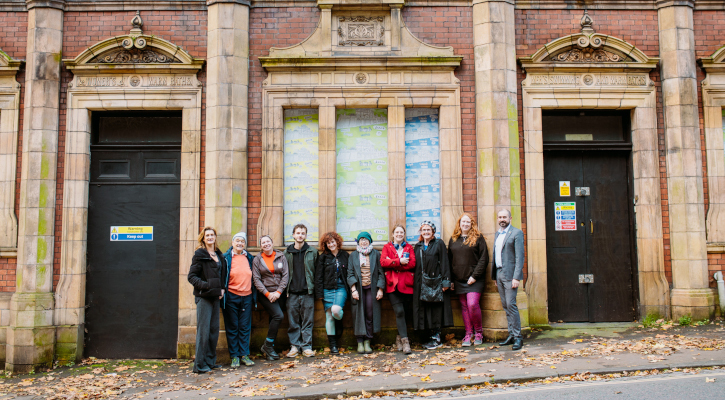
Photo Credit: Alastair Brookes
The momentum to restore Jacobs Wells Baths, Hotwells, Bristol, has seen a significant boost with the unveiling of a newly installed artwork on the front of the building as part of a Fundraiser to raise funds to repair and restore the Grade II listed former dance centre.
The artwork, a bespoke pen and ink drawing by Bristol-based artist Amy Hutchings and supported by Anna Haydock-Wilson, features words shared by members of the Hotwells community, gathered from a community consultation led by Trinity Community Arts as part of our mission to restore and reopen the building. suppor
The artwork features as a reward for the Jacobs Wells Fundraiser that we have launched on the Bristol based Fund Surfer platform.
We are calling for Bristol residents to give what they can to help us reach a £5,000 fundraising target. These funds will help towards crucial costs as part of the current investigations and identified works. People can donate via the Bristol based Fund Surfer platform.
“It’s great to see this exciting progress after the disappointment and uncertainty surrounding the restoration of Jacobs Wells Baths. The new artwork demonstrates how much this Grade II listed building means to the local community,...any contributions will be vital for achieving the vision of bringing the site back into use as a community arts hub, building on the 35-year Community Asset Transfer lease which we awarded back in July.”
Councillor Craig Cheney, Deputy Mayor for Finance, Governance, Performance, and Culture
Amy is not the first renowned artist to put their name to the appeal to save the building - earlier this year esteemed actress Miriam Margolyes shared a heartfelt video outing the importance of community spaces such as Jacobs Wells Baths, and encouraging people to get involved and support the drive to safeguard the building and re-open the space once more.
Trinity, alongside local councillors, residents and Hotwells and Clifton Community Association, have been leading the project to restore the building since the news in Jan 2023 that the former dance hub was at risk of disposal by Bristol City Council.
Since then, the Council's CAT Group announced its decision to offer Trinity Community Arts, a registered charity, a 35-year CAT lease, subject to receipt of a satisfactory business plan. We also received a six-month occupational license during the transfer phase, to enable Trinity to undertake a detailed series of specialist surveys, funded by the Bristol-based Nisbet Trust and to undertake emergency works to halt any further damage to the roof due to water ingress.
We have secured further funding from the Architectural Heritage Fund, Sylvia Waddilove Foundation UK and others - aimed at matching the committed funding from the Nisbet Trust to support the development phase and investigations to understand the scope of work needed to restore and reopen Jacobs Wells Baths.
Emma Harvey, CEO Trinity leading on the Jacobs Wells Baths recovery project said; “We often stroll past boarded up buildings like this, imagining how they could be put to good use. The community have long campaigned to save this space and want to see it brought back into use for public benefit. That’s why we’re working hard to secure funds to restore this amazing space. Anyone wanting to support this transformative journey can donate via our Fundsurfer appeal to help us reach our target."
Support the Fundsurfer and grab your own Jacobs Wells artwork
Exploring cultural confidence and its impact
Exploring cultural confidence and its impact
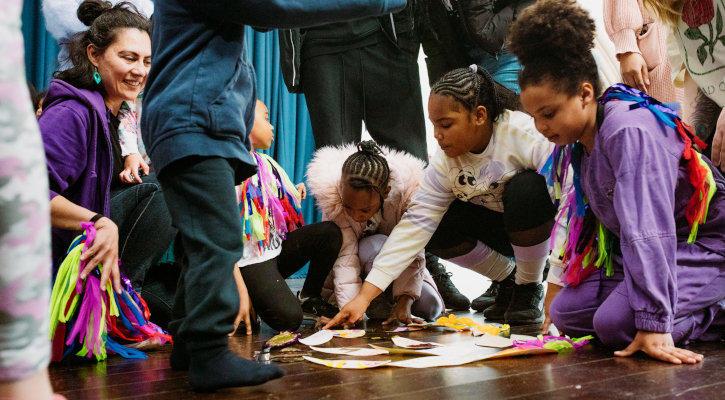
Dance workshop for primary aged children at Trinity. Photo credit: KoLAB Studios
Earlier this year Trinity was awarded a Tech Makers and Maintainers grant from Power to Change, which enabled us to look at ways in which we could utilise our Customer/Constituency Relationship Manager (CRM) to better collect and report upon data. The grant allowed us to take the time to think about how this work connects with our wider commitment to understanding people's cultural journeys.
Following the publication of our own ‘Cultural Confidence Scale’, we have connected with two universities to test this scale and to create the technology to collect and process the data we need to demonstrate the impact of Trinity’s work.
We caught up with Dr Astrid Breel of Bath Spa University; Professor Iain Gilchrist of Bristol University, and member of the MyWorld project team; Trinity’s Emma Harvey and Sarah Bentley to find out more about our Cultural Confidence scale and how community tech will be helping us to ‘Tell Our Story’.
Unpacking Cultural Confidence – Emma Harvey, CEO Trinity Community Arts
“Trinity’s Cultural Confidence Scale is a theory of change that has been developed in response to our desire to understand how we can better tell the story of an individual's journey in engaging with culture and creativity at Trinity. It is the idea that we (as consumers of culture) start our journey in an unfamiliar place to gradually building confidence through increased experiences, within familiar settings, and then move into unfamiliar settings, to then get to what I would say is the kind of peak of our Cultural Confidence Scale, which is what we hope to be - autonomous free cultural consumer. To go where we choose, consume what we want to choose, and that we are sufficiently aware and conscious enough and confident enough to be able to do those things.
A lot of our work, particularly around some of our children and young people's programmes or our targeted community work, is grant-funded. We are then having to measure against a separate set of outcomes or outputs, so that you can attribute some of those outcomes, for example Health, to coming and taking part in the arts. These to us are secondary measures to the actual primary measure of people coming and just having a rich, exciting cultural experience together. What value does that in and of itself have that's intrinsic, that we accept that arts and culture is good for us? There's a lot of academic reports to that degree. But for us, the question is how can we then understand that cultural journey a little bit more clearly, that may also include health and wellbeing outcomes and learning outcomes and various other outcomes.”
Testing the Cultural Confidence Scale - Dr Astrid Breel, Bath Spa University
“I am the Impact Research Fellow at Bath Spa University, and I am interested in understanding how people make meaning out of their experiences and find value in things like cultural or arts experiences.
I work in a community-led way that is in equal partnership with stakeholders and will start by thinking through together what are the different kinds of impacts and values that Trinity's work has? What does it mean to people? What did they get out of it? And how can we talk about that kind of stuff better, and to do this in a way that is not reductive - as it can be if we used metrics and value systems that already exist.
Within Trinity’s Cultural Confidence Scale we will be thinking with the community to see how they see themselves within the Scale. We will be exploring ways in which we can ask people good questions, in order for them to be able to share part of their reflection on their experiences with us so that we can better understand their journeys and how they find value in their journeys at Trinity.
The other element of that is thinking through the kind of more practical impact and evaluation strategies that exist at Trinity so that we can basically tell better stories in a way that is both rigorous because it's based on people's experiences, but more complex and nuanced than potentially some of the existing evaluation methods that currently exist and that are off the shelf”
Neuropsychology: How culture impacts our mental lives – Professor Iain Gilchrist, Bristol University
“I'm Professor of Neuropsychology at the University of Bristol. Neuropsychology is the a scientific endeavour to understand our mental lives. Understanding our mental lives is embedded in the actual function of the brain. We want to understand how your brain leads you to have the experiences you have - and that includes really complex experiences like cultural experiences, like going to an event at Trinity or being engaged in Trinity in some way or other, to understand what that does to our mental lives and also indirectly what that does to our minds and brains.
What is interesting about this project is that Trinity itself has the Cultural Confidence Scale – a well-worked out and quite sophisticated framework for understanding people's cultural journeys. Trinity also has this amazing data that you collect anyway, and an opportunity and an openness to collecting more data in a richer way in a more interconnected way. I'm really interested in being part of that discussion with all the stakeholders broadly – as I think there is a real opportunity, in the long term to open the possibility of helping people understand their cultural journey; help Trinity to map those journeys; and help Trinity and other stakeholders support individuals and groups of individuals who may not know where the culture journey goes next.”
Connecting the dots: creating tech that works for organisations, not organisations that work for tech- Sarah Bentley, Communications and Development Manager, Trinity Community Arts
“As an organisation, we have utilised ‘Community Tech’ - that is technology that is community driven or community-led–not off-the-shelf software or subscription models.
We have always been interested in having tech that is driven by our organisational needs - that can be developed in a way that responds to what we need. We started this year with a grant for Power to Change to maintain our Open-Source CRM. Our CRM, is based on CiviCRM, a web-based suite of internationalised open-source software for constituency relationship management that falls under the broad rubric of customer relationship management. To undertake work to help us maximise the system's ability to both gather and report upon data. We have ended the year being able to connect the dots between our Cultural Confidence Scale and the software we use to gather data in a way that is both meaningful and responsive to – not just what we need but other grassroots organisations and smaller charities – all of which, like us, have to process data for various stakeholders.
This processing of data, both in its collection and end reporting, is time-consuming. We live in a data-driven world, and we feel that if we can add value to the data through our Scale and also create affordable tools for people to collect this data, we are adding value not just our work but to the wider cultural sector.”
Our journey continues to evolve, and we will keep updating our findings via blogs and social media. Read our blogs so far:
-
Reflections on a year of 'Open Working'
-
Understory mapping: 'community connectiveness'

Reflections on a year of 'Open Working'
Reflections on a year of 'Open Working'
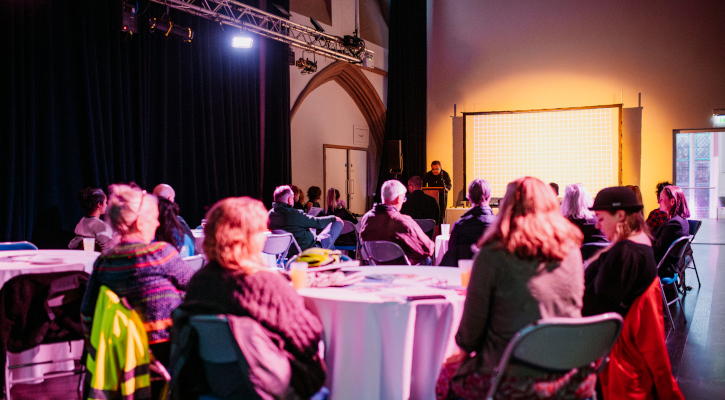
Trinity's Annual AGM, one of the many events in which we share data with stakeholders
At the start of 2023, Trinity was awarded a Maker and Maintainers grant from Power to Change, which kicked started a transformative journey in our open-source development.
"For me Community Tech is all about tech that is led by our organisation as opposed to tech that leads our organisation" Sarah Bentley
This blog post, by Development and Communications Manager, Sarah Bentley, reflects on the lessons learnt and the evolution of our approach to Community Tech and Free and Open Source Software (FOSS).
Vision for Community Tech and FOSS: Our vision was to use FOSS to enable efficient data management and reporting. We collect data across a wide-range systems and platforms, from ticket updates to promoter reports, audience numbers for annual reports, to impact statistics. Our goal was not only to streamline our own processes but also to create accessible tech solutions for grassroots and smaller organisations.
Open Working and Transparency: As part of the grant, I participated in an Open Working course, this emphasised the importance of transparency in our steps and work. This approach complemented our existing Working Group model and allowed us to communicate our vision for Community Tech and FOSS both internally and externally.
Time for Reflection: The grant provided a valuable opportunity for introspection. In my multifaceted role, which I describe as 'money in and stories out,' I rarely have the chance to consider the bigger picture. As a Maker and Maintainer, I delved into how Community Tech and our Tech Makers project aligned with our broader initiatives, specifically how we can communicate why we choose FOSS over over 'off-the-shelf systems' or platforms like Google Forms.
Engagement with FOSS Community: Dedicated time with the FOSS community revealed that our efforts with CIVICRM hadn't gone unnoticed. People shared our interest in building solutions through CIVI, leading us to support a research project within CIVI on real-time data reporting. Engagements included community meet-ups, connections with charity/grassroots communities, and presentations at institutions like Bristol University.
Democratising Data: In my role as the data processor and visualiser, I realised the significance of empowering communities with data ownership. Sharing our processes resonated with others contemplating similar approaches. The focus shifted towards making data more democratic, placing power in the hands of the people rather than businesses' with differing values.
Our tech journey continues to evolve and we will keep updating our findings via blogs and social media. Read more about how we are engaging in community tech solutions:
- Reflections on a year of 'Open Working'
- Understory Mapping'.

Nature Play
Nature Play
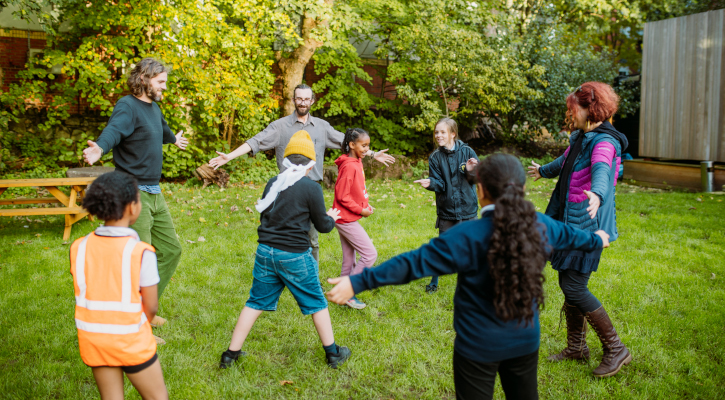
Nature Play Sessions. Photo credit: Alastair Brookes, KoLAB Studio
As part of our children and young people's programme we are providing free after school provision for children who attend local primary schools. Children who attend are aged 8yrs-11yrs and many have limited access to any green space at home. In our first term 22 children have taken part.
‘I loved it, every bit of it.’ Feedback, Nature Play
The sessions are facilitated by our Nature Play team which include qualified Forest School teachers and playworkers. During the sessions children connect with nature and share their ideas to help shape activities. Each week when the children come they start the sessions climbing one of our apple trees to collect an apple! Other activities include painting pumpkins, digging and planting, identifying animals and listening in nature.
Children also have the opportunity to learn more about the natural world, from learning about seasons, to understanding sustainability. They also learn more about the community they live in. Nature Play enables children to meet together and to create and form relationships with peers, outside of school.
If you are a parent/carer of a primary aged child (8yrs-11yrs) who would like to attend Nature Play click here to find out more and sign up.
Nature Play is held on Monday's during term time and is made possible due to funding from Quartet Community Foundation, WESport and Bristol City Council.
Understory: Mapping Social Connectiveness
Understory: Mapping Social Connectiveness
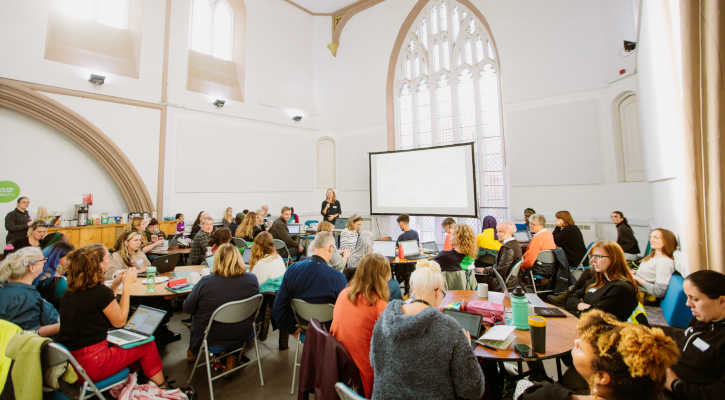
Understory Workshop. Photo credit: Alastair Brookes/KoLAB Studios
In Oct 2023 we collaborated with Onion Collective to deliver 'Understory' - an interactive workshop in which participants collectively create a digital map of social connections within the local community. The workshop, which took around 1.5hrs, was hosted by Georgie from Onion Collective.
We invited a wide range of local cross-sector organisations to participate in the workshop. Organisations represented ranged from those who are known to us to many had not connected to Trinity but are working within the local community. These included statutory services, Grassroots and DIY networks as well as community activists who are working in areas including health, activism, human rights and education.
During the workshop, the group answered a series of questions that created, in real-time, an interactive map projected throughout the session. The map, accessible to organisations who have taken part in the workshop will be an invaluable tool to help inform our plans as we go forward, and for all the other organisations who participated too.
Following the session, we hosted an informal networking opportunity which allowed people, many of whom had not connected with each other before, to meet and connect. In total, 63 people took part representing 38 organisations.
We will be hosting a follow-up for anyone who came along and people who were named on the map (and did not attend) so they can add to and build up the network.
This workshop is part of our wider commitment to working with our local community to create a relevant and responsive cultural offer. You can find out more about this vision here.




